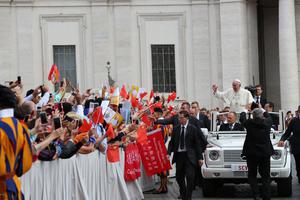Cardinal Parolin: Don’t Judge the Trump Administration Rashly
In a new interview, the Vatican Secretary of State also shares his views on China, Europe, Venezuela — and Russia to where he will make an historic visit at the end of August.

It’s still too early to judge the Trump administration, the Holy See must continue to pursue constructive and patient dialogue with both China and Russia, and nationalism risks emptying Europe of its values and reason for existence.
These were some of the main points made by Cardinal Pietro Parolin, the Vatican Secretary of State, in a new interview, published today in the Italian financial daily, Il Sole 24 Ore.
In the exchange — a kind of short survey of today’s global political scene — the Vatican’s chief diplomat said “time is needed to judge” a new U.S. government that is “so different and unique,” adding that it must be given time to “find its own balance.”
“Any judgement now is hurried, even if sometimes the show of uncertainty itself can surprise,” he argued in comments that echoed those of Pope Francis at the time of Trump's inauguration.
His diplomatic approach contrasts with a recent highly contentious article in La Civilta Cattolica that strongly criticized President Trump and what it called an “ecumenism of hate” between evangelicals and Catholic “integralists.” The Jesuit periodical is checked by the Secretariat of State before publication.
The cardinal said the Holy See hopes the U.S. and other nations will not be diverted from their international responsibilities, and highlighted in particular “new climate change challenges,” reducing the “inequalities and poverty that global warming continues to produce,” and dealing with current conflicts.
Some figures in the Vatican, which has divergent views on the environment, voiced strong opposition in June to President Trump’s decision to withdraw from the Paris Climate Agreement.
But the primary focus of Cardinal Parolin appears to be the East, most notably Russia and China.
He noted how differences are often stressed between Russia and the West as if they were “two different worlds, each with their own values.” He therefore advocated better reciprocal understanding between those who risk presenting themselves “as opposite poles.” This is done, he added, not through yielding to one position or the other, but through “patient, frank, constructive and at the same time respectful dialogue.”
This is all the more important when it comes to dealing with the origins of current conflicts, Parolin added, and stressed that the search for peace should be “placed above any national or partisan interest.” Indulging in national self-interest, a characteristic of today’s return to nationalism, “distracts” nations from realizing that catastrophes cannot be automatically averted, he said.
Cardinal Parolin is to make an historic visit to Russia at the end of August with the aim of improving Holy See relations both with the Kremlin and the Russian Orthodox Church.
The cardinal’s trip will also pave the way for a potential visit by Pope Francis which some believe could happen as early as next year, although given the strength of opposition to the Catholic Church among grassroots Orthodox, a later date may be more likely.
Asked about Pope Francis’ frequent warnings of a Third World War being fought “piecemeal,” the Vatican Secretary of State agreed that the international system is facing a “phase of great uncertainty” with multiple actors having differing and conflicting interests. He also said a doubling in number of those living in absolute poverty over the past 30 years (now 400 million people) means there cannot be neither peace nor development in those areas.
Holy See diplomacy is simply one of “peace,” he continued, adding it has “no power interests, neither political, nor economic, nor ideological.” The Vatican, he said, seeks nothing for itself, but tries to bring opposing sides to dialogue and stop them being torn apart by hate. He did not explicitly mention Christ or the Prince of Peace in the interview, but said the Gospel can help people and nations to “turn back from a wrong direction.”
Cardinal Parolin paid tribute to the recently deceased former German Chancellor Helmut Kohl, saying the reunification of Germany that he oversaw was a “sign of the development of Europe” in which a country like Germany could “legitimately and effectively operate.” It is now not the case of a “Germanized Europe but a Europeanized Germany.”
On Europe, the cardinal spoke clearly in favor of closer political union and, alluding to Brexit, is concerned about a growing nationalism that can end up “emptying Europe of its values and reasons.” He also warned against “indifference” on immigration which he believes leads to giving up “possible goodness.”
Cardinal Parolin said he felt “immense pain” at the suffering taking place in Venezuela where the socialist dictatorship of President Nicolás Maduro has led to food shortages, economic turmoil and violence. The diplomat, who served as apostolic nuncio to the country before Francis appointed him Secretary of State in 2014, said he strongly hoped the “voice of the Pope” would be heard and prevent the country from “falling into the abyss.”
Finally, on China and Vietnam the cardinal did not reveal any concrete developments, but again stressed the importance of dialogue which “opens towards encounter” and helps to build trust.
The cardinal, whose approach to China has been criticized for seeking “success at all costs,” said the Church has a right to demand religious freedom which will bring harmony. But he said such possibilities must be coupled with a “healthy realism,” knowing that the destiny of humanity is “above all, in the hands of God.”
- Keywords:
- cardinal pietro parolin
- holy see
- vatican


















